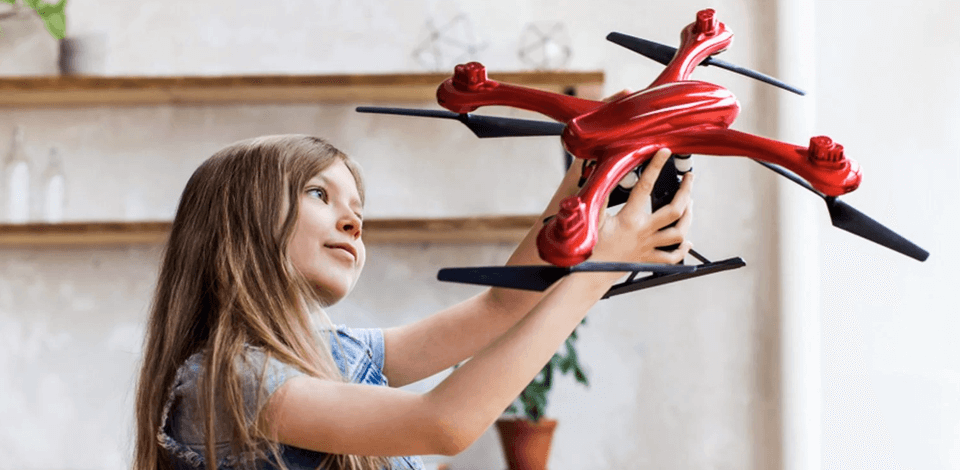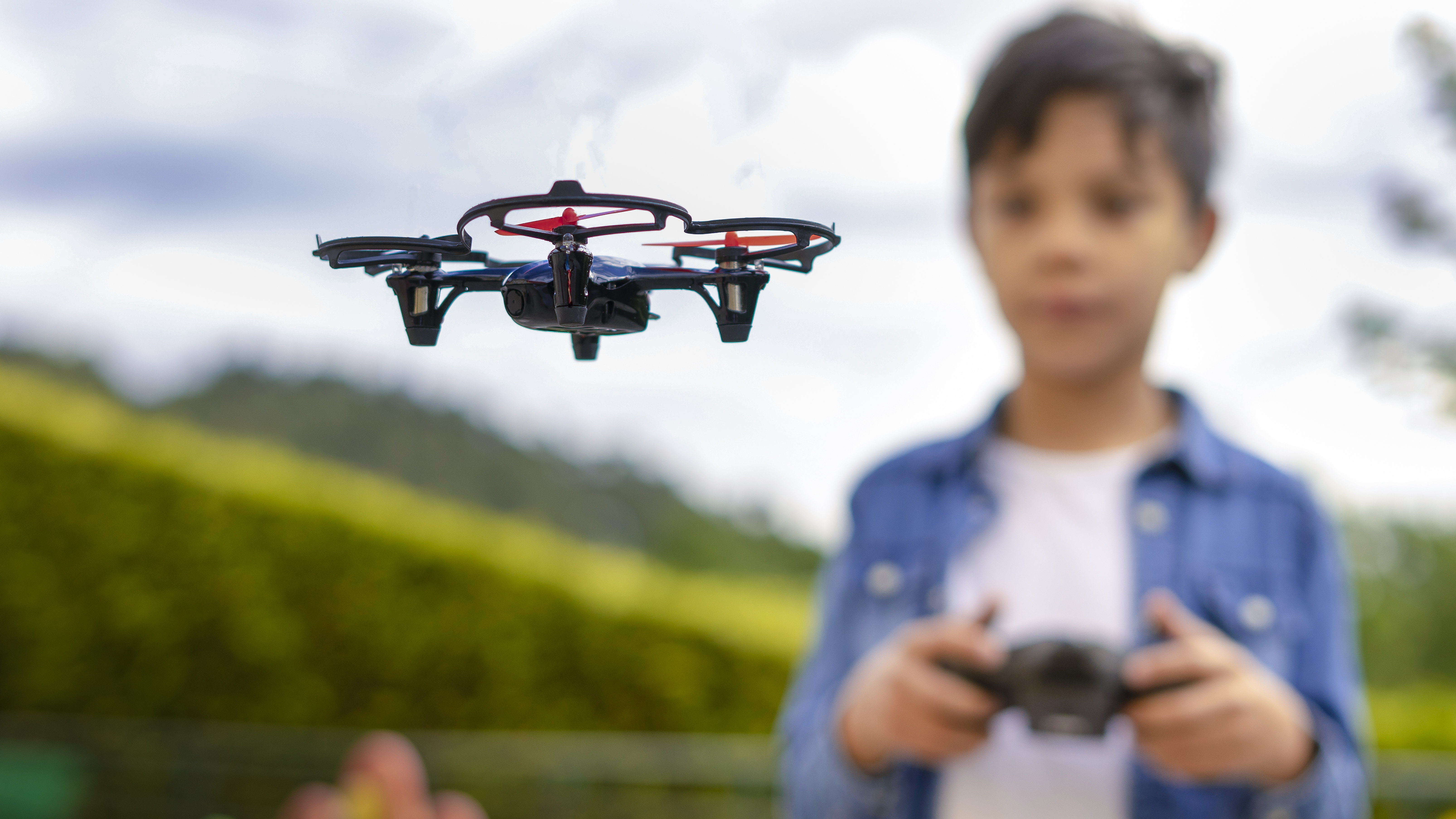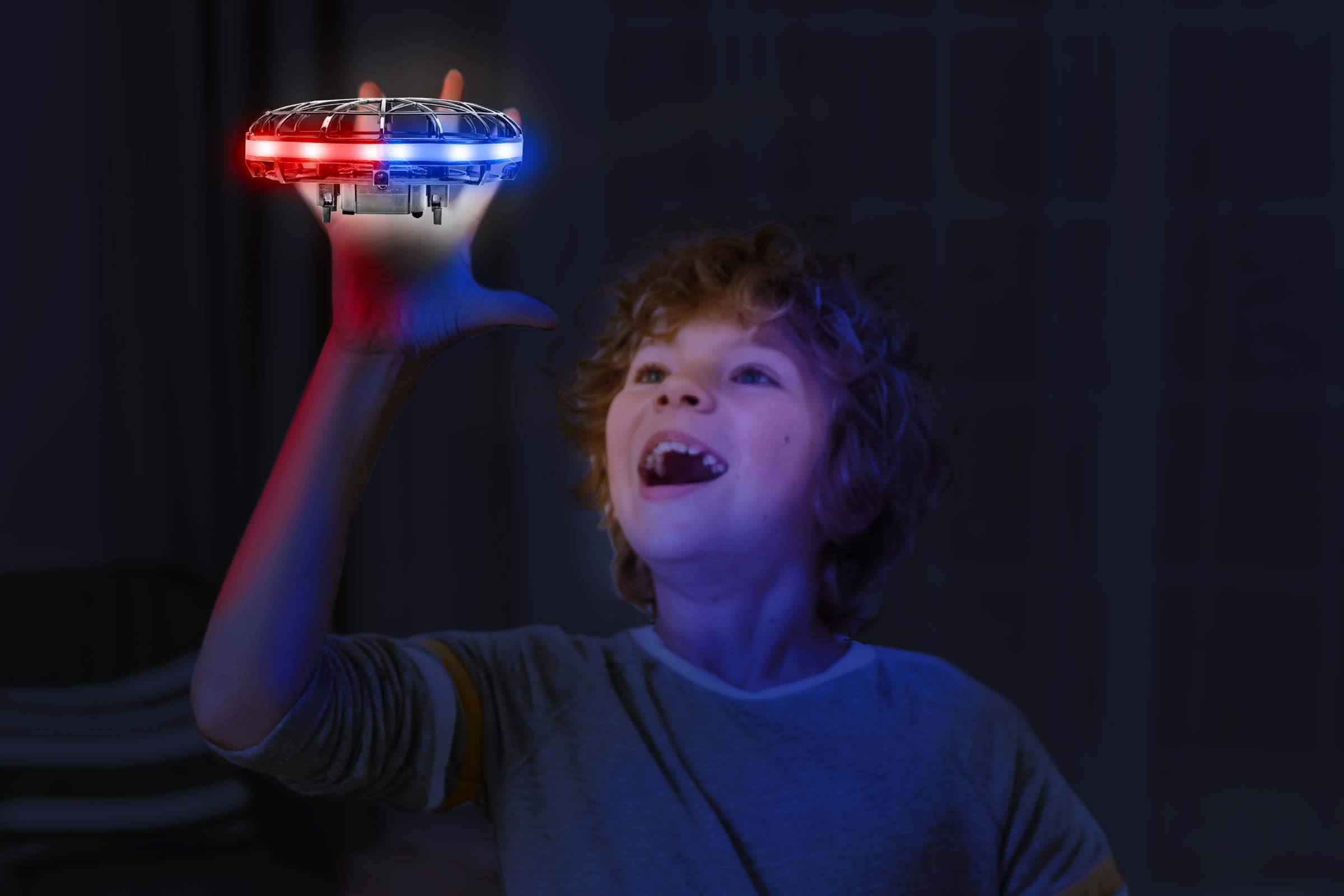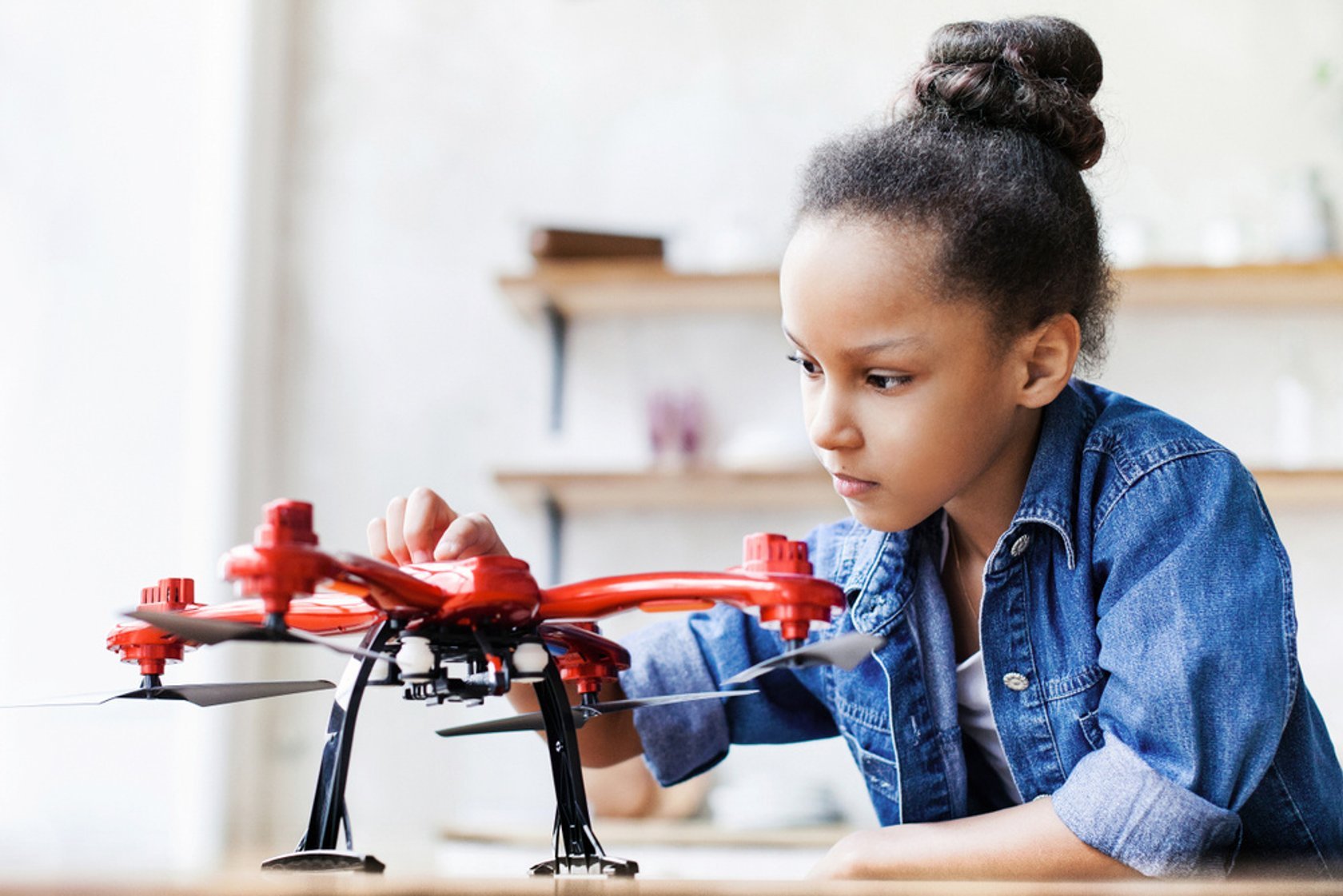
I’ve been doing real estate for a long while now and have a couple of drones at home, which made my children become more and more interested in them, hence why I decided to find the best drone for kids precisely to make them happy.
It will not only satiate their interest and get them to spend time outside to take a break from the PlayStation but will also foster a deeper understanding of electronics and boost their computer skills.
The cost of such drones can range anywhere from 20 and 30 dollars to as high as 300 dollars, but it all depends on your specific needs and how your kids intend to use it.
Kid drones have user-friendly features and they won't burn a hole in your pocket. Some of these drones even come with a camera, while others can double as racing drones.
On top of that, there's a separate category of "drones" designed with kids, resembling flying spaceship toys that are just perfect for school-aged youngsters.
Best overall
Age: 14+

I have found the DJI Ryze Tello to be the best drone for kids in its price range. It is a reliable, sturdy, and user-friendly mode, and setting it up only took 3 minutes.
It boasts a 5MP camera that captures solid-quality photos, and even though the live video feed has some lagging, the saved footage can look choppy. This drone offered about 10-15 minutes of flight time, and even though it’s not extremely long, my kids were more than happy with that.
Learning how to control this aerial photography drone is pleasantly simple. We’ve used it both indoors and outdoors without any issues.
We elevated the drone to as high as 30 feet. Its default speed is set to slow, which is a better fit for inside use. If you’re outside, switch to the fast mode and enjoy the large range (equivalent to an entire baseball field) and intuitive controls.
This drone ensures you don’t have to worry about kids damaging it. My children crashed into walls, ceilings, trees, and the lawn. The Ryze Tello simply stops and once you pick it up and place it on a surface – it’s ready for flight again. It’s impressively sturdy and includes spare propellers in the kit. What's more, it is capable of performing jaw-dropping stunts like flips and bounces. For those with more expertise, it supports programming with the MIT-developed Scratch.
Specs:
|
Dimensions: |
3.9 x 3.7 x 1.6 inches
|
|
Weight: |
0.18 lbs
|
|
Max range: |
100 meters |
|
Max flying time: |
13 minutes
|
|
Camera: |
✔️ (5 MP, 720p) |
|
Indoor: |
✔️ |
|
Outdoor: |
✔️ |
Best toy drone
Age: 14+

I was happy to get my kids to try this drone as it comes with spare batteries and solid propeller protection since our experience using unprotected propellers has shown that they can be easily damaged. It's lightweight and offers 3 different speed settings, allowing my kids to practice and hone their skills at their own comfortable pace.
This beginner drone can take off and land with a single press on a remote, or you can simply toss it to launch. With just one press, it can perform impressive 3D flips and encircle an object. In addition, it's equipped with an auto-hover function and is highly responsive to the remote control's commands, irrespective of the orientation. The developers also added an emergency landing button.
It is a mini drone for kids, so handling it won’t be a problem if a child has small palms. However, the small size made it difficult to replace the batteries. That issue aside, it’s a great little drone and the propeller protectors do a great job prolonging its service life. I think it’s the best beginner drone for kids that they can use to cause mayhem without breaking the bank.
Specs:
|
Dimensions: |
3.15 x 3.15 x 1.18 inches |
|
Weight: |
1.76 oz
|
|
Max range: |
50 meters
|
|
Max flying time: |
21 minutes |
|
Camera: |
❌ |
|
Indoor: |
✔️ |
|
Outdoor: |
✔️ |
Best family drone
Age: 16+

I was glad to see that this model isn’t just a terrific drone for kids, but also a good drone under 500 dollars for adults. It also weighs less than 250g, meaning you won’t have to register it if you’re in the United States.
It lacks collision prevention or the 4K camera included in the latest model, but their specifications and flight controls are nearly identical. It offers a simple setup and can be easily mastered even by small children.
Since my eldest have phones, they can enjoy functionality similar to the ones provided by pro-grade drones. The Mini 2 SE supports 2.7K video recording and taking photos in up to 4000x3000 resolution. Supplied with mechanical stabilization, this camera can capture stable footage if you manage to avoid pixel-peeping.
The only accessories you’ll have to buy since they aren’t included in the package are a charger plug adapter and a mini SD card. The card isn’t mandatory, but having one will help you record videos in higher quality.
Specs:
|
Dimensions: |
7.87 x 6.3 x 2.17 inches
|
|
Weight: |
8.4 ounces |
|
Max range: |
6 km
|
|
Max flying time: |
28 minutes
|
|
Camera: |
✔️ (12 MP, 2.7K) |
|
Indoor: |
❌ |
|
Outdoor: |
✔️ |
Best beginner FPV
Age: 14+

I have found BetaFPV Cetus to be the best FPV drone camera for kids if you’re on a tight budget, as it comes with goggles, a controller, and the drone itself. My children had tons of fun from the moment this drone first took flight. However, it isn’t just a toy, as it’s also capable of complex maneuvers if you put in the time to learn and master the controls.
This drone with a camera is a fantastic choice for newbies, especially thanks to its special mode that improves flight stability. After my children learned the basics of flying using the controller and goggles, they started using the drone on their own, and despite having to endure a ton of crashes and falls, the BetaFPV Cetus continued to work properly.
One caveat that you should keep in mind is that the lighter weight of this model makes it more challenging to fly in strong winds. It’s also important to have a “spotter” nearby. If your kid is wearing the goggles and using the drone in FPV mode, there needs to be someone near them to check the surroundings and ensure they’re staying safe.
Specs:
|
Dimensions: |
10 x 8 x 5 inches
|
|
Weight: |
1.47 lbs
|
|
Max range: |
80 meters
|
|
Max flying time: |
5 minutes
|
|
Camera: |
✔️ |
|
Indoor: |
✔️ |
|
Outdoor: |
✔️ |
Best ease of use
Age: 6+

Even though all the aforementioned drones are suitable for kids, controlling them using a remote control can be too difficult for small children. That’s why I chose the Force1 Scoot for my 6-year-old son since it can be operated with the user’s hands. It also offers some creative play capabilities, like a game of drone catch or tag.
The drone is reasonably compact and caged, meaning it can be approached and held even when it’s flying without risking severely hurting your child. This cheap drone is pleasantly lightweight without feeling like it would break from a light bump.
The flying process is pleasantly straightforward. You can drop or toss the drone and it will automatically stabilize itself and take flight. My little kid didn’t have any issues launching it. This model has a slow rotation, resembling a UFO, especially with its lights. It does a solid job avoiding obstacles and whenever it collides with things, it just bounces off them. Despite a bit of roughhousing, we didn’t do any notable damage to the drone.
Specs:
|
Dimensions: |
4.3 x 4.3 x 1.84 inches
|
|
Weight: |
4.6 ounces
|
|
Max range: |
N/A
|
|
Max flying time: |
8 minutes
|
|
Camera: |
❌ |
|
Indoor: |
✔️ |
|
Outdoor: |
✔️ |
Best portable
Age: 14+

Using this drone under 100 bucks is even easier than most of the alternatives covered above, which is why I can confidently recommend it to beginners. It’s also quite small and easy to transport and carry.
The batteries arrived pre-charged and I was also happy to see the D2 remains fully stable even when the battery is running low. The controls are pleasantly convenient and are highly responsive even when the drone is almost out of juice. You can also rotate the camera angle up to 90º, which is extremely useful when you want to snap photos or film footage straight down.
The controller has a small set of buttons that cover all the essential features and the joysticks are pleasant to use here as well. The trim feature works perfectly, meaning the kids could even fly the drone indoors without causing any trouble.
I also appreciated the lights added to both sides of the D20. It’s easy to see from a distance even in the late evening. Additionally, despite being compact, this model is heavier than most competitors, meaning it isn’t as susceptible to wind.
Specs:
|
Dimensions: |
7.72 x 6.38 x 1.69 inches
|
|
Weight: |
2.43 ounces
|
|
Max range: |
50 meters |
|
Max flying time: |
20 minutes
|
|
Camera: |
✔️ (720p) |
|
Indoor: |
✔️ |
|
Outdoor: |
✔️ |
Best coloring
Age: 8+

I have found Tomzon A23W to be among the best drones for kids, especially if they’re still very young. It’s a highly compact model that is perfect for indoor use. It can perform flips in limited spaces as well as spin and do pirouettes with a single button press.
There’s zero delay between the remote control input and the drone and setting up and calibrating the Tomzon has also been pleasantly simple. It automatically synchronizes with the controller and you can calibrate it by pressing the special button on the remote. While it’s far from the best drone for photography, its camera still provides some solid results.
This model is quite sturdy. My little ones crashed it several times, but it’s still working without any issues. The LED lights are very useful and can be adjusted with the remote. The batteries are also pleasantly durable, particularly for such a compact drone.
Specs:
|
Dimensions: |
9 x 7.7 x 3.2 inches
|
|
Weight: |
1.16 oz
|
|
Max range: |
N/A
|
|
Max flying time: |
18 minutes
|
|
Camera: |
✔️ (1080p) |
|
Indoor: |
✔️ |
|
Outdoor: |
❌ |
Flight duration and battery recharging. Nearly all models aimed at children have somewhat short flight durations, mainly because of how heavy the batteries are. This can be a bit disheartening when you want to have fun, especially if recharging takes a long time.
When picking drones for this overview, I prioritized models that offer at least 10 minutes of flying, although it can involve doing a battery replacement sometimes. However, you shouldn’t worry too much about this aspect, as my experience shows that 20-30 minutes is more than enough for kids.

Intuitive and straightforward controls. Children can easily get irritated with gadgets that are difficult to control, so try to find a drone with a simple launch feature and automated aerial moves that will impress beginner drone pilots.
You can also consider getting your children a model like the Force1 Scoot since it doesn’t even require a controller and can be operated with hand gestures. You can move on to more complex and feature-rich drones afterward.
Weight and size. The lineup of the top drones for kids can mostly be used without registering with the FAA. The models I added to my overview are lightweight enough for child use and catching. If you plan to launch the drone indoors or take it on frequent playdates, consider picking one of the more compact options.
Range and signal strength. Usually, the range isn’t an important factor in children's drones since they’re ordinarily used in the backyard, in a park, or inside your house, so losing signal is very rare.
However, if your child plans to fly the drone in large open areas, consider picking a model that has a range of 150 feet or more. Keep in mind that if the drone flies out of range, it can lose control and crash.

Flight modes and autonomous functionality. Models with pre-configured maneuvers, from automated takeoff and landing to tricks and flight patterns, can do wonders for helping your children have a blast with their drones. Give preference to options that have sensors for detecting and avoiding obstacles, especially if the drone will be used inside your house.
Most drones are aimed at kids starting at 8 years old, but some of the models can even be controlled by 4-year-olds as long as they’re supervised by an adult. Lastly, if you plan to get a bigger drone that requires FAA registration, then 13 is the age that you should aim for.
It should include plastic guards that would protect your child’s fingers from the propellers. It’s also a good idea to get lightweight models so that they don’t damage the things they bump into.
Unless you’re specifically looking for the best camera drone for kids, the camera quality isn’t that important. The key to having fun is to enjoy watching the drone fly, not look at a screen. If you’re getting a drone for an older child, then having a camera with a resolution of 1080p or higher can be a good idea.
Pick an option with automated controls. Those usually entail pressing a button or flipping a switch to launch or land the drone. Such functionality is essential for avoiding accidents and needless irritation. As the kid grows more accustomed to controlling the drone themselves, the need for automated flying will gradually decrease, opening the doors to more advanced models that offer increased flight distances and duration.
Usually, such drones don’t require FAA registration since it's only demanded for models that weigh over 250 grams (0.55 pounds). However, if you pick a heavier model, you’ll need to pay $5 for an FAA license that is valid for 3 years.